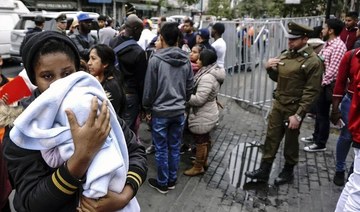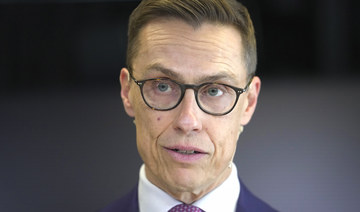WASHINGTON: The fate of former President Donald Trump’s attempt to return to the White House is in the hands of the US Supreme Court.
On Thursday, the justices will hear arguments in Trump’s appeal of a Colorado Supreme Court ruling that he is not eligible to run again for president because he violated a provision in the 14th Amendment preventing those who “engaged in insurrection” from holding office.
Many legal observers expect the nation’s highest court will reverse the Colorado ruling rather than remove the leading contender for the Republican presidential nomination from the ballot. But it’s always tricky to try to predict a Supreme Court ruling, and the case against Trump has already broken new legal ground.
Some of the main issues involved in the 14th Amendment cases:
What did Trump potentially violate?
It’s called Section 3 and it’s pretty brief. It reads:
“No Person shall be a Senator or Representative in Congress, or elector of President and Vice President, or hold any office, civil or military, under the United States, or under any State, who, having previously taken an oath, as a member of Congress, or as an officer of the United States, or as a member of any State legislature, or as an executive or judicial officer of any State, to support the Constitution of the United States, shall have engaged in insurrection or rebellion against the same, or given aid or comfort to the enemies thereof. But Congress may by a vote of two thirds of each House, remove such disability.”
Nice and simple, right?
Not so fast, Trump’s lawyers say.

Republican presidential candidate and former US President Donald Trump walks during a rally ahead of the New Hampshire primary election in Manchester, New Hampshire, on January 20, 2024. (REUTERS/File Photo)
Trump's defense
Trump’s lawyers say this part of the Constitution wasn’t meant to apply to the president. Notice how it specifically mentions electors, senators and representatives, but not the presidency.
It also says those who take an oath to “support” the United States, but the presidential oath doesn’t use that word. Instead, the Constitution requires presidents to say they will “preserve, protect and defend” the Constitution. And finally, Section 3 talks about any other “officer” of the United States, but Trump’s lawyers argue that language is meant to apply to presidential appointees, not the president.
That was enough to convince the Colorado district court judge who initially heard the case. She found that Trump had engaged in insurrection, but also agreed that it wasn’t clear that Section 3 applied to the president. That part of her decision was reversed by the Colorado Supreme Court.
The majority of the state’s highest court wrote: “President Trump asks us to hold that Section 3 disqualifies every oath-breaking insurrectionist except the most powerful one and that it bars oath-breakers from virtually every office, both state and federal, except the highest one in the land.”
Other Trump arguments
Trump’s lawyers contend that the question of who is covered by a rarely used, once obscure clause should be decided by Congress, not unelected judges. They contend that the Jan. 6, 2021, attack on the US Capitol wasn’t an insurrection. They say the attack wasn’t widespread, didn’t involve large amounts of firearms or include other markers of sedition. They say Trump didn’t “engage” in anything that day other than in exercising his protected free speech rights.
Others who have been skeptical of applying Section 3 to Trump have made an argument that the dissenting Colorado Supreme Court justices also found persuasive: The way the court went about finding that Trump violated Section 3 violated the former president’s due process rights. They contend he was entitled to a structured legal process rather than a court in Colorado trying to figure out if the Constitution applied to him.
That gets at the unprecedented nature of the cases. Section 3 has rarely been used after an 1872 congressional amnesty excluded most former Confederates from it. The US Supreme Court has never heard such a case.
Arguments about legal precedents go back to a lone 1869 opinion from Chief Justice Salmon Chase, who was hearing an appeal as a circuit judge rather than for the high court.
The Trump case is historic and is expected to create new law.
Isn't this just a partisan case?
Not really. A lot of Democrats are rooting for Trump to get kicked off the ballot and a lot of Republicans are angry about the campaign against him. The case was filed by Citizens for Responsibility and Ethics in Washington, a left-leaning group.
But some of the most vocal proponents of removing Trump from the ballot are conservative legal scholars who believe in following the strict words of the Constitution. There’s no way around the insurrection disqualification for Trump, they argue, adding it’s there in the plain text and was intended by the authors. The plaintiffs in Colorado are all Republicans or unaffiliated voters.
All seven of the justices on Colorado’s Supreme Court were appointed by Democrats. But they split 4-3 on the decision, a stark demonstration that this case doesn’t divide neatly along partisan lines.
The majority quoted a ruling from Neil Gorsuch, one of Trump’s conservative Supreme Court nominees, from when he was a federal judge in Colorado. He ruled then that the state properly kept a naturalized citizen born in Guyana off the presidential ballot because he didn’t meet the constitutional qualifications.
In Maine, the Democratic secretary of state also removed Trump from the ballot. But in Illinois, a Republican retired judge serving as a hearing officer for the state Board of Election suggested keeping Trump on, but only because he thought courts should decide on eligibility. The retired judge found it was likely Trump was disqualified due to Section 3, making him a notable Republican to side with those trying to remove the former president.
The US Supreme Court is comprised of six justices nominating by Republican presidents, including three by Trump. Partly because this is completely new legal ground, it’s hard to predict how individual justices will rule based on their ideology.
What could the court do?
Several outcomes are possible but they generally fall into three areas.
The first is the court could uphold Colorado’s ruling. That would require wins for the plaintiffs on the whole array of Trump’s defenses.
The second is the court could rule that Trump cannot be disqualified under Section 3, period. There are a lot of ways the court could do this, but the result would be to end the case against him, as well as dozens of similar challenges filed across the country.
The third possibility unnerves a lot of legal experts. The court could effectively punt and not make a final decision on whether Trump is qualified to serve as president. That could kick the question down the road to Jan. 6, 2025, if he wins the election and Congress has to decide whether to certify his victory.
It also would keep alive many of the challenges across the country. A number of them are on hold because state courts are waiting to see what the US Supreme Court will do. Places where a Trump challenge could be rekindled if the high court doesn’t squelch it include Illinois, Minnesota and Oregon. It could add further pressure to challenge Trump’s position on the ballot in other Democratic strongholds such as California and New York, where there have been pushes to invalidate his candidacy that have been comparatively muted.
While the Trump campaign says more than 60 Section 3 cases have been filed nationally, most are by low-profile figures and have generally been dismissed for procedural issues. Uncertainty from the nation’s highest court could encourage a new wave of cases in those states, too.
The lack of a clear ruling also could create counter-challenges. Republicans have warned that Section 3 also can be applied to Democrats.
Some already have proposed filing against Biden under the theory that his inability to stem the flow of migrants at the US-Mexico border amounts to providing “aid and comfort” to the country’s enemies. Vice President Kamala Harris also could be targeted under the theory that her raising bail money for people arrested during the protests over George Floyd’s 2020 murder by Minneapolis police amounts to “engaging in insurrection.”
Unless the high court shuts this down, they warn, Trump’s case might only be the start.



























